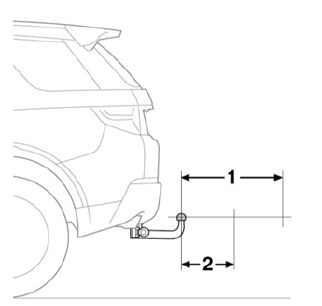Land Rover Discovery: Essential towing checks
Do not exceed the Gross Vehicle Weight (GVW), maximum rear axle weight, maximum trailer weight, or nose weight.
Exceeding any of these limits could cause instability and a loss of control.
Do not loop the breakaway cable or safety chain over the tow ball, as it may slide off.
- To maintain vehicle stability, the trailer's nose load should be set at approximately 7% of the caravan/ trailer's gross weight (and a minimum of 4%).
- When towing a trailer with more than one axle, the trailer should be loaded to achieve even weight distribution between axles.
- When calculating the laden weight of the trailer, remember to include the weight of the trailer, plus the weight of the load.
- If the load can be divided between the vehicle and trailer, loading more weight into the vehicle will generally improve stability. Do not exceed the vehicle's weight limits.
- Increase the rear tyre pressures on the towing vehicle to those for maximum vehicle loading conditions.
- Make sure that a suitable breakaway cable, safety chain, or secondary coupling is used. Refer to the trailer manufacturer's instructions for guidance.
- Always connect the breakaway cable or safety chain to the provided connection point. Do not loop it over the tow ball.
- Make sure that the tow ball is secure.
- Check the operation of all the lamps on the trailer.
TOWING A TRAILER
- Never exceed the maximum weights for either the vehicle, or the trailer. Doing so can cause accelerated wear and damage to the vehicle. It can also adversely affect vehicle stability and braking, which in turn can lead to a loss of control and an increased braking distance, resulting in a rollover or crash.
- Only fit towing accessories approved by the vehicle manufacturer. These have been designed to help make sure that the handling and stability of the vehicle is not affected, if used correctly, and according to the manufacturer's instructions.
- Never use towing eyes or lashing points to tow a trailer. They have not been designed for this purpose and doing so may cause them to fail, resulting in injury or death.
Note: A reduction in the performance of the Air conditioning system is a normal function under high load towing conditions.
Note: Engine power output always reduces with increased altitude. At 1 000 metres above sea level and for every additional 1 000 metres, deduct 10% from the Gross Train Weight (GTW).
The Touch screen can display a rear view to assist with the reversing of the vehicle with a trailer attached
TOW BALL MOUNTED ACCESSORIES

Before fitting a tow ball mounted accessory, make sure that it has been approved for use on this vehicle.
The use of unsuitable equipment can result in severe damage to the towing bracket.
Before fitting an accessory to the tow ball, observe the following guidelines:
- The attached accessory must not protrude more than 700 mm from the tow ball.
- The centre of gravity of the tow ball mounted equipment and the load combined, should not exceed a distance of 390 mm from the ball. The maximum weight at this distance must not exceed 82.4 kg.
Note: The forces exerted by the trailer nose weight and the tow ball mounted accessories are different in nature, hence a separate limit applies to both.
Note: Only use an approved bicycle rack, catering for a maximum of 4 bicycles.

